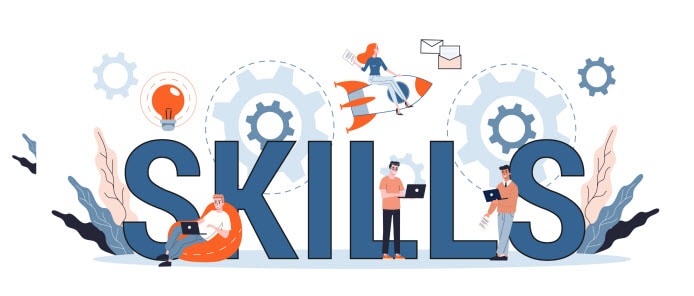Skills to include in your CV (with examples!)
Salaries are rising and competition for talented employees intensifies as companies grow their teams. While that means it may be easier to find a job, you’ll still need a solid resume to land the job you really want. Here are some tips to help you showcase your skills in your resume and stand out from the competition.
Skills to highlight in a CV
There are two main types of job skills in a CV: job skills and personal skills. Professional skills or technical skills are those that are necessary to perform the job and that are acquired through practice, education or training. Personal skills, also sometimes referred to as interpersonal skills or emotional intelligence, including qualities such as being able to communicate effectively or maintaining a positive attitude to achieve goals. These skills are transferable, you can use them for different tasks or different jobs.
When candidates have equivalent professional skills and experience, personal skills can tip the balance.
Fifteen examples of personal skills to put in your CV
To help you determine which personal skills to include on your resume, look at the different tasks of the job and identify the personal strengths that would help you perform these tasks successfully. Here are some examples:
- Adaptability
- Great attention to detail
- Collaboration
- Communication
- Creativity
- Decision making
- Empathy
- Leadership
- Ability to multitask
- Positive attitude
- Problem and conflict resolution
- Personal motivation
- Teamwork
- Time management
- Professional ethics
How do personal skills apply if you are aiming for a systems engineer position? You could indicate in your resume how your ability to collaborate with colleagues has helped you design software to improve operations. For a receptionist position, showing empathy would be a valuable personal skill.
Ten examples of professional skills to put on your CV
Job skills vary from job to job. In your CV, accompany your professional skills with specific experiences when possible. For example, instead of just listing technologies , a Front-End Web developer might talk about expertise in HTML, CSS, and JavaScript, while a financial controller might mention expertise. solid foundation in GAAP or SEC reporting.
Here are some examples of professional skills:
- Accounting or bookkeeping
- Data analysis
- Knowledge of foreign languages
- Mathematics
- Product design
- Project management
- Proficiency in software
- Search engine optimization
- Typing skills
- Writing and editing
Remember that your CV should illustrate, using examples, how you used the professional skills most relevant to the position you are interested in.
Take the skills and formulations of the job description
Many companies filter resumes and cover letters to find the keywords they have used in their vacancies. Some use an applicant tracking system. It is an electronic filter that collects, sorts and prioritizes CVs with the aim of reducing the number of applicants to the most qualified people. This is why your CV should contain words and phrases that are found in the job posting, as long as you actually have the skills you name of course.
If an employer is looking for a graphic designer and “proficiency with the Adobe Creative suite is required,” don’t just put “experience with software for creative professionals.” Likewise, if an employer is looking for an accountant with “experience in the day-to-day bill and credit management,” use similar words in your resume rather than “collecting receipts.”
As each job description is different, adapt the skills and keywords of your CV and cover letter according to each position to give you every chance of landing an interview.

Discover the skills sought by the company
In addition to using the job description as a guide, it’s helpful to have an idea of the type of people the company typically hires. But how do you find this information? Research, research, research. If you know someone who works or has worked for the company, contact that person to ask what the employer thinks is important about their employees. Follow the company on social media and visit its website. The “About” page is usually a good place to start.
For example, the IBM site offers candidates to “live our values”:
- Dedication to the success of each client
- Innovation that matters, for our company and for the world
- Trust and personal responsibility in all relationships
If you were applying for a job at IBM, you could think about what personal skills you have that are compatible – such as attentive, detail-oriented, proactive, or loyal – and incorporate them into your resume.
At Robert Half, we put forward four fundamental principles:
- Example of leadership
- Ethics first
- Appreciation of new ideas
- Dedication to excellence
If you are applying for a job at Robert Half, you might highlight skills that exemplify your leadership , your drive and your determination as well as your confidence and your ability to collaborate .
Conclusion: Be very attentive to the type of candidates sought by employers and then highlight your most relevant strengths.
Create a section dedicated to your skills in your CV
Here are some of the general presentation and formatting standards that apply to writing a CV:
- Do not exceed one page (a maximum of three pages for higher-level positions).
- Write clear section titles.
- Choose an easy-to-read font.
- Include the following sections: contact details, summary presentation, professional titles, professional experience, skills and training.
If you are applying for a position that requires specific technical skills, you can include a skills section at the start of your CV, above your professional experience. Another option is to add a sidebar, but the bottom line is that it be the most visible, the most attention-grabbing part of your resume.
Personal skills can also be highlighted in a dedicated section, or be combined with your technical skills in a more general section on your “key skills” or “areas of expertise”. If these skills are relevant to the job, make sure they are clearly visible on your resume, but still add professional skills as often as you can.
Highlight your skills throughout your CV
In your CV, indicate your skills in the main section on work experience. An example is worth a thousand words. Rather than saying that you are a good communicator, give concrete examples.
Here are some explanations of common skills candidates put on their CVs along with examples of how to present them:
Communication. Focus on your oral and written communication skills or your excellent active listening skills. Showcase your excellent communication skills with colleagues, manager and clients, and provide concrete examples:
“Writing a monthly newsletter emailed to customers, which increased the number of potential customers by 35%. “
Ability to multitask. Nowadays, managing multiple tasks simultaneously is the norm for many employees. Indicate in your resume the types of tasks and situations that you have handled on a regular basis – and how you have managed to do it calmly and effectively.
“I have managed several projects and several deadlines. I also acted as a liaison between clients and my colleagues, collecting and implementing feedback from both parties on projects with tight deadlines. “
Leadership skills. Whether you are managing a team or influencing your colleagues in a positive way, employers often seek candidates who possess leadership skills.
“I led a team of ten people from different parts of the company. By working together, they managed to reduce operating costs by 15%.”
Set priorities. Employees often have to tackle multiple projects simultaneously, and many requests come in unexpectedly, requiring them to keep their cool under pressure. Describe in detail how you prioritize your projects and requests. Above all, an employer does not want an employee who easily loses his temper.
“I prioritized various web design projects for a team of 20 in a fast-paced, calm environment. “
Sense of initiative and aptitude for problem-solving. Demonstrate how indispensable you have become to your former managers by explaining concretely how you took the initiative to solve problems and take care of special projects. Or indicate your excellent ability to assess complex business problems and come up with creative solutions.
“I have implemented new consolidation procedures for monthly and quarterly closings, reducing the time spent on closing by 30%. “
Reliability. No matter the job, hiring managers look for people who do what they say they will do. Reliability can be especially important if you are working with external clients. A missed deadline can mean lost customers and a damaged reputation.
“I completed projects on time or in advance, and always kept my professional commitments, which has earned me greater professional responsibilities and promotion. “
Technical skills. As mentioned before, you should state job-specific technical knowledge, whether you are an administrative assistant or a user experience designer:
“I have developed personas and use cases for various clients in various fields such as finance, law and entertainment. “
Depending on the position sought, candidates will of course have to present different skills, as shown in the following examples for jobs in customer service, accounting, marketing and web development.
Important skills that should be on your CV for customer service jobs
When customers have questions or concerns about a business, they often start by approaching customer service teams to provide them with a service or resolve a problem. Such positions, where employees interact with the public, often require skills like these:
- Data entry
- Listening carefully
- Problem-solving and research
- Patience
- Speed and efficiency
- Positive attitude
- Diplomacy
Skills to be developed for accounting jobs
Accountants don’t just have to be good at numbers, they also need to draw conclusions from data and then pass those conclusions on to people outside of their department. They should have skills in the following areas:
- Software, such as Microsoft Excel
- Integrated management software
- Business and leadership
- Oral and written communication
- Data analysis
- Revenue recognition
- Risk and compliance
- Generally Accepted Accounting Principles (GAAP)
Marketing positions and skills sought
A resume for a marketing position should demonstrate exceptional communication skills and experiences at different levels with respect to the professional and personal skills related to the position, such as:
- Content creation
- Market research
- Web analysis and referencing
- Critical thinking
- Creative spirit
- Project management
- Digital tools and platforms, such as content management systems
- Social networks
What’s Important for Web Development Jobs
The technical requirements for web developer positions can be specific enough to require experience with ASP.NET, CSS, MySQL and MS Access. But it’s often the less technical aspect that will help candidates stand out. Here’s what they need in terms of experience and expertise:
- Troubleshooting
- Programming
- Operating systems
- Applications and databases
- Programming and design
- Search engine optimization
- Friendliness
- Web content management
- Project management
Have you grouped your skills together on your CV? Before submitting your final version, check out the following dos and don’ts.
DON’T go overboard or lie about your skills
Whether you are listing a certification you don’t have, an academic honor you never received, work experiences that didn’t last as long as you said or an overrated job title, do making false claims or distorting the truth is not worth the risk.
Most companies check past experiences and candidates’ references. In today’s digital world, the truth about your past experiences will inevitably be known, so make sure you have a flawless resume.
Explain things clearly using numbers and facts
You don’t have to work in finance or manage a budget to make certain points with numbers on your resume. No matter what position you aspire to, you can quantify your worth rather than being ambiguous.
Did you manage to implement several projects in a short period of time? Have you made it possible to reduce your business expenses, increase sales or enter target markets? Were you responsible for the performance of team members? Should you respond to customer inquiries or process orders? All of these accomplishments involve numbers that you should use.

Don’t clutter your CV with clichés
Some words and phrases have become so ubiquitous in resumes that they hardly generate more than yawns and annoyance among employers. Hiring managers are so accustomed to hearing about “experts” who “think outside the box” that these empty descriptions have now become meaningless.
Here are some powerful words and action verbs to focus on:
- Innovative
- Set up
- Realize
- Perfect
- Improve
- Launched
- Reduce
- Coordinate
Review your CV
Don’t email your resume until you’ve combed it through for spelling, grammar, or formatting mistakes. Then ask someone who understands your job search goals to take a look at them. Proofread a printed version. Sometimes it is easier to spot mistakes on paper than on a computer screen.
Be aware of wordy passages or inconsistent verb tenses (past tense, then present, then past tense again) and personal pronouns ( I, you, me, our, we ).
Taking the time to create a unique, focused CV for each job opportunity that shows both your professional and personal skills takes time, but it’s worth it. You will have a much better chance of getting past the applicant tracking software stage. Plus, you’ll be well prepared when you are called for an interview. Doing a real reflection on the skills you have that best match the position will help you assert your candidacy during a job interview.
It’s time your skills worked for you!




